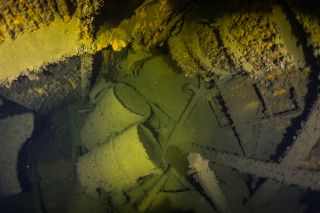International reference centre for dumped chemical weapons will be established in the Tri-City
We have already referred to the problem of dumped chemical and conventional weapons in the Baltic. This is currently one of the biggest and most pressing threats to the ecosystem of our sea and a danger to human health. However, there is a chance that concrete actions will be taken to clean the Baltic Sea of these war remnants.
Approx. 60 thousand tonnes of chemical weapons, including 15 thousand tonnes of poison chemical warfare agents are deposited at the bottom of the Baltic Sea. This is a consequence of the decision to "neutralise" combat weapons by sinking them after World War II. In the case of the Baltic Sea, we know of large chemical weapons dump sites in the area of the Bornholm Deep and the Gotland Deep. However, some of the weapons were also sunk on the route to the official neutralisation areas, so locating them remains a huge challenge.
The International Centre for Chemical Safety and Security (ICCSS) is taking the initiative to address this problem and establish an international reference centre for sunken chemical weapons, whose headquarters will be located in the Tri-City. On Wednesday, a meeting was held with representatives of business, science and government agencies, during which the shape and direction of development of this institution was discussed.
“This is the last moment to act, or someone else will do it instead. Poland should take the lead in the disposal of chemical weapons in the Baltic Sea. We should not miss this opportunity – said Krzysztof Paturej, the chair of the ICCSS, project coordinator.
We applaud this ambition for Poland to become the pioneer in solving the problem of dumped chemical weapons in the Baltic.
The ICCSS centre in the Tri-City is planned for the beginning of 2023. The three main goals are to work on the regulations and guidelines, create an international platform for scientific cooperation and build a technological hub, bringing together business and technologies. The plan has entered the implementation stage. A special group will prepare the founding documents by mid-April. A work plan will be prepared by June.
We will keep our fingers crossed for this initiative, as well as for similar actions to be taken as soon as possible to deal with fuel deposited in shipwrecks.


